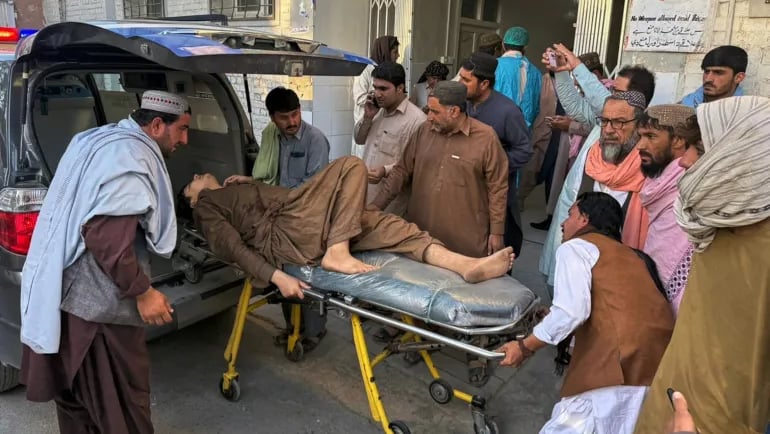GLOBISCOPE
Pakistan-Afghanistan Ceasefire: What We Know and Whether It Will Hold
PAKISTAN
Globiscope
10/20/20253 min read


Islamabad and Kabul agree to a truce brokered by Qatar and Turkiye but deep mistrust could test its survival.
By Globiscope News Desk
October 20, 2025
After a week of deadly border clashes that left dozens dead and hundreds injured, Pakistan and Afghanistan have reached an “immediate ceasefire” — a move hailed as a major diplomatic breakthrough, though doubts linger over how long it can last.
The ceasefire, mediated by Qatar and Turkiye, follows days of escalating violence along the 2,600km Pakistan-Afghanistan border, marking the lowest point in bilateral relations since the Taliban’s return to power in 2021.
Ceasefire Agreement Reached in Doha
According to Qatar’s Foreign Ministry, both sides have agreed to end hostilities and “establish mechanisms to promote lasting peace and stability.” The deal was finalized in Doha after intense negotiations between Pakistani and Afghan delegations.
The statement added that follow-up meetings will be held “in the coming days to ensure the sustainability and verification of the truce.”
Pakistan’s Defence Minister Khawaja Asif confirmed the agreement on X (formerly Twitter), stating:
> “Cross-border terrorism from Afghan territory will cease immediately. Both countries will respect each other’s sovereignty and territorial integrity.”
He further revealed that a second round of talks is scheduled for October 25 in Istanbul, where delegations from both countries will work out monitoring mechanisms.
Pakistan’s Deputy Prime Minister and Foreign Minister Ishaq Dar described the ceasefire as “a step in the right direction”, emphasizing the need for a “concrete and verifiable system” to monitor cross-border threats.
> “It is important to prevent any further loss of lives and ensure that Afghan soil is not used for terrorism,” Dar said.
On the Afghan side, Zabihullah Mujahid, spokesperson for the Taliban government, said both nations reaffirmed their commitment to “mutual respect, non-aggression, and constructive neighbourly relations.”
> “Neither side will support or harbor groups carrying out attacks against the other,” he added, thanking Qatar and Turkiye for mediating the talks.
Skepticism Over Long-Term Viability
Despite optimism, experts warn the truce may be fragile. Elizabeth Threlkeld, Director of the South Asia Program at the Stimson Center, told Al Jazeera that the deal’s endurance remains uncertain.
> “Groups like the TTP (Tehreek-e-Taliban Pakistan) were not part of the Doha talks. That means they are not bound by the ceasefire,” she said.
Threlkeld added that enforcing peace would be difficult due to the porous border, making it hard to prevent infiltrations even with Pakistan’s fencing and patrols.
> “It’s going to be extremely challenging for the Taliban to control the TTP, even if they genuinely want to,” she noted.
Pakistan’s Concerns About Cross-Border Terrorism
For months, Islamabad has accused the Afghan Taliban of providing safe havens to the TTP and Balochistan Liberation Army (BLA) — both blamed for a surge in deadly attacks inside Pakistan.
According to the Center for Research and Security Studies (CRSS), over 2,400 people have been killed in violence so far in 2025, mostly in Khyber Pakhtunkhwa and Balochistan provinces bordering Afghanistan.
Pakistani journalist Javaid Ur-Rahman told Globiscope that Islamabad’s message during the Doha talks was clear:
> “Pakistan will no longer tolerate cross-border terrorism originating from Afghan territory.”
While the Taliban insists it does not allow Afghan soil to be used for attacks, Pakistan argues that militant sanctuaries remain active in border provinces like Paktika and Khost.
Deep-Rooted Tensions Over the Durand Line
A long-standing dispute over the Durand Line — the de facto border drawn in 1893 — continues to strain relations. Pakistan recognizes it as the international boundary, but Afghanistan does not.
This disagreement has often resulted in armed skirmishes, further complicating border management and anti-terror operations.
Analysts Warn of a Fragile Peace
Afghan political analyst Abdullah Baheer said the ceasefire is welcome but may not hold without trust and restraint from both sides.
> “Bombing Afghanistan into submission didn’t work for the United States in 20 years — it won’t work for Pakistan either,” Baheer warned.
He argued that the TTP, though ideologically aligned with the Taliban, operates independently and cannot easily be controlled by Kabul.
> “There are no winners in war — only losers. Peace requires dialogue, not escalation,” Baheer added.
The Road Ahead
The upcoming Istanbul meeting on October 25 will be crucial in determining whether this truce transforms into a long-term peace framework. Observers say the creation of a joint verification and monitoring mechanism could be key to maintaining stability.
But with mutual distrust, cross-border militancy, and deep historical grievances, sustaining the ceasefire will test both nations’ diplomatic willpower.
For now, the guns have fallen silent — but whether Pakistan and Afghanistan’s ceasefire can endure amid old hostilities remains an open question.
Globiscopes news 2025
Globiscopes news empowers the generation of tomorrow for a brighter future and hope for every individual.
inbox
Subscribe to our newsletter and never miss a story.
We care about your data in our privacy policy.
